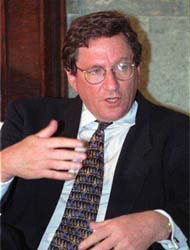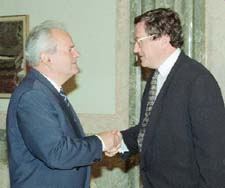


Stage 5 - Arrested and Interrogated
Related IssueThe Negotiators
It was nine o'clock at night when Faye Bowers answered the phone in Boston Saturday, Oct. 29, but already 3 o'clock the next morning in Sarajevo. David Rohde was on the line to Bowers at home to tell her he wasn't going to file the story he had planned to do on the Dayton Peace Talks for Monday.
He told her, "I'll send you an e-mail that explains everything, OK?" and hung up.
Bowers wondered why Rohde sounded so short on the phone; they usually talked two or three times a day for a good 20 minutes.
"I thought, 'Gosh, he's mad at me. What did I do now?'"
It wasn't until she checked her e-mail at 6:30 Monday morning that she had any idea of what Rohde was really up to.
"Oh my God. I gotta go tell the editor about this."
Bowers told her superiors what had happened. They decided there was nothing they could do except stand behind Rohde's decision to re-enter Serbian territory.
And had Rohde asked Bowers, she might indeed have let him go back into Serb territory. She knew Rohde would go to any lengths to do get the story. But his earlier stories on the massacre at Srebenica created quite a stir in the press. The Serbs knew who Rohde was.
Bowers said the area where the gravesites were "was controlled by Bosnian Serbs and if they refuse to let you enter, you enter at your own risk -- and it was quite a risk."
By Monday afternoon, there was no sign of Rohde in Sarajevo. Bowers started sending out press releases telling of Rohde's capture. She called journalists, U. N. officials, and CIA contacts all over the Balkans. They told her that the Serbs had Rohde, something the State Department denied.
Frustrated by not having a definitive answer, Bowers, Monitor pubisher David Cook, and several of Rohde's family members flew the following Friday to Wright-Patterson Airforce Base in Dayton, Ohio to press U.S. Assistant Secretary of State Richard Holbrooke to negotiate for Rohde's release in the peace talks.

U.S. Assistant Secretary of State Richard Holbrooke in Belgrade, August 1995. PHOTO: AP
John Menzies, U.S. Ambassador to Bosnia, set up a meeting with Bowers, Cook, Rohde's family, and Bosnian President Nikola Koljevic. Koljevic demanded that the U.S. write a letter saying that Rohde had done something wrong. Holbrooke, who later joined the meeting, refused saying that Rohde could not have trespassed into a territory with no autonomy.
After negotiating a draft letter, Koljevic phoned Bosnian Serb President Radovan Karadzic and read it to him. As the Americans took a coffee break, an unidentified American in the room with a wire in his ear said, "Oh my God. They just said that they have David in Bijeljina, not Pale, and that they picked him up in Zvornik on the same day he left." He was eavesdropping on Koljevic's entire conversation in the hallway.
When Koljevic returned to the room, Holbrooke started playing with Koljevic's wool plaid fedora. "Maybe I can hold your hat hostage, until you get David out," Holbrooke said.
Finally on Saturday, Nov. 4, Koljevic arranged to have Rohde call the group in Dayton from the Red Cross office.
"That was the first time for sure we really knew he was alive," Bowers said.
Until his release, Rohde had no idea that he had become a subject of negotiations at Dayton.
"I get on the phone and it was my Dad and three siblings. And I remember thinking they've all gone to Washington and they're missing work, this is so stupid, this is no big deal." He immediately felt uncomfortable with the impact his imprisonment was having on talks.
Holbrooke wrote in his 1998 book To End a War that Rohde's imprisonment created a huge snag in the talks, and gave the Bosnian Serbs an advantage. The Americans didn't want his imprisonment too widely publicized, so as to avoid giving the Serbs free publicity. But Holbrooke was unwavering in his demand that Rohde be released before the talks could proceed.
Milosevic was astonished. "You would do all this for a journalist?" he said.
"Yes," Holbrooke replied. "We would have no choice."
Holbrooke had a personal interest in Rohde's case. Earlier in the fall, he met Milosevic, Gen. Ratko Mladic, and Karadzic in a hunting lodge outside of Belgrade to discuss the upcoming Dayton talks. Before beginning, he plopped Rohde's stories about Srebenica down on the table. Milosevic got the message that Mladic and Karadzic could never be a part of the talks, since the articles implicated both of them in the massacre.

Serbian President Slobodan Milosevic, left, greets U.S. Assistant Secretary of State Richard Holbrooke in Belgrade in August 1995. PHOTO: AP
Holbrooke's wife, journalist and chairwoman of the Committee to Protect Journalists, Kati Marton, pestered Milosevic repeatedly during dinners at Dayton.
"I think this was a giant embarrassment to [Milosevic]," she said at the time. "I talked to him about the full weight of the American media coming down on the Serbs in general for holding this man."
She's described their conversations as the most intense of her life.
Warren Christopher also helped in drafting a letter to Milosevic demanding Rohde's release. But the biggest incentive to release Rohde may have come from Rohde's family.
"The family members were there every day," said Bowers. "They had to look at them in the face."
Rohde's father, Harvey, wrote a personal letter to Karadzic on hotel stationary. "Please, please, in the name of God, release my son," he wrote.
Meanwhile Rohde kept hope he would be released by reflecting on the stories that survivors of the massacre had told him.
"I was just really determined. It was bad, but it was nowhere near what other people went through there."
On the evening of Tuesday, Nov. 7th, Milosevic asked Holbrooke to come to his room at Dayton.
When Holbrooke arrived, Milosevic told him, "This time you must join me in a drink - because your American journalist, Mr. Rohde, will be released in the morning and sent across the border. This was very difficult."
Serbs from Belgrade came to pick up Rohde and take him back to the U.S. embassy. Before he left, Rohde's captors wanted him to drink a toast with them. Rohde refused.
"I just wasn't gonna drink with the Bosnian Serbs. I was like, 'Screw you, I'm gonna tell the story anyway.' And they still let me go."
Back in Dayton, Bowers, Cook, and Rohde's family were euphoric, and asked diplomats to thank Milosevic. Christopher also sent his thanks to Milosevic. Milosevic turned Rohde's release into an opportunity to portray himself as the problem solver, the peace-maker.
Rohde talked to Holbrooke, Christopher, and President Clinton by phone from Belgrade. He said he hoped he hadn't "screwed up" the negotiations. He later sent a handwritten letter to Holbrooke from Tuzla which ended with:
"I apologize if my detention complicated your efforts in Dayton. The last thing I wanted was to be an obstacle to peace. You made me a priority when you didn't have to, and I thank you. I saw two survivors recently. One told me I was a hero. The other told me I was a fool. I think the latter got it right. My family and I cannot thank you enough. I am a very, very lucky person."